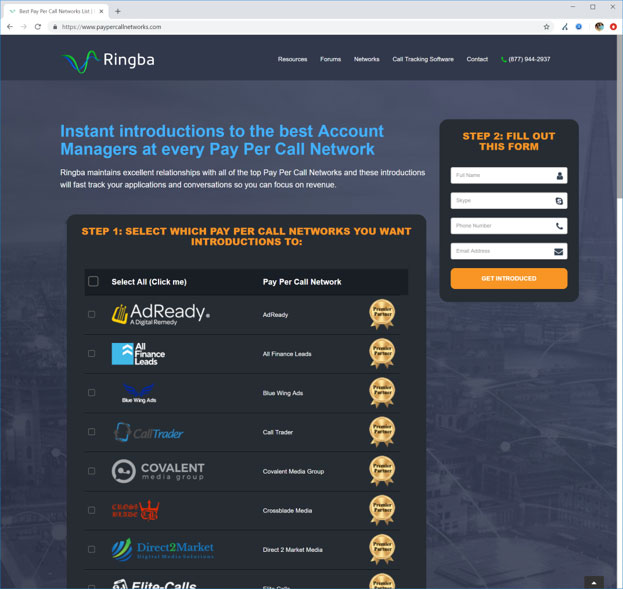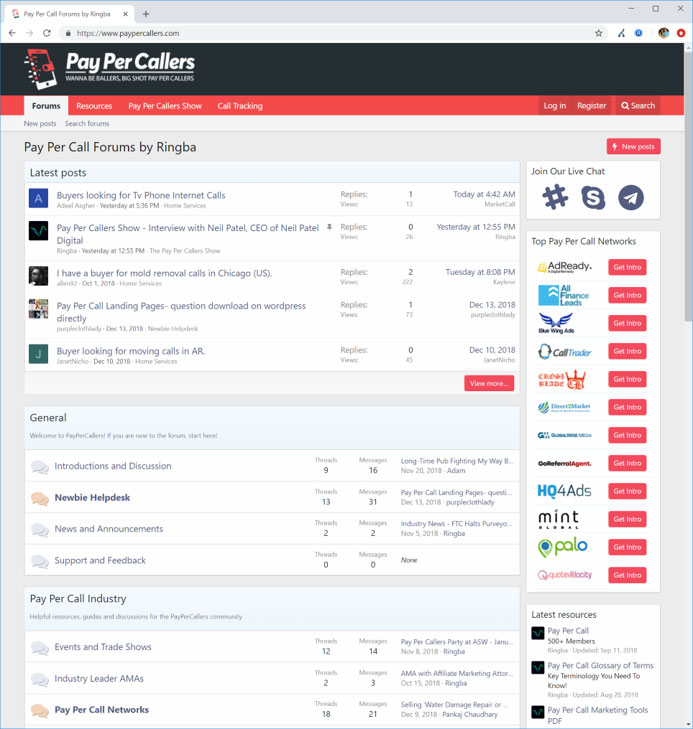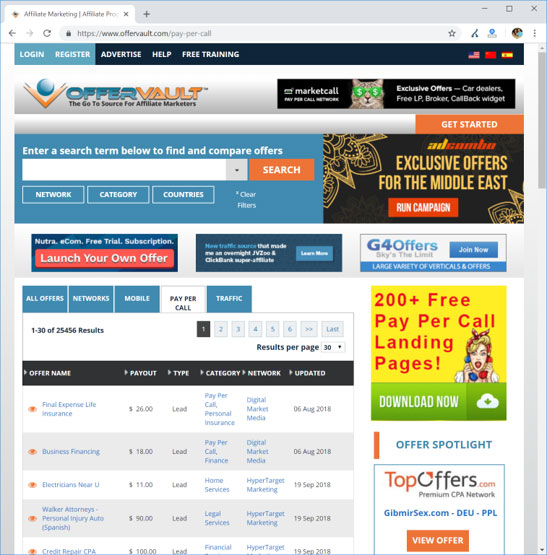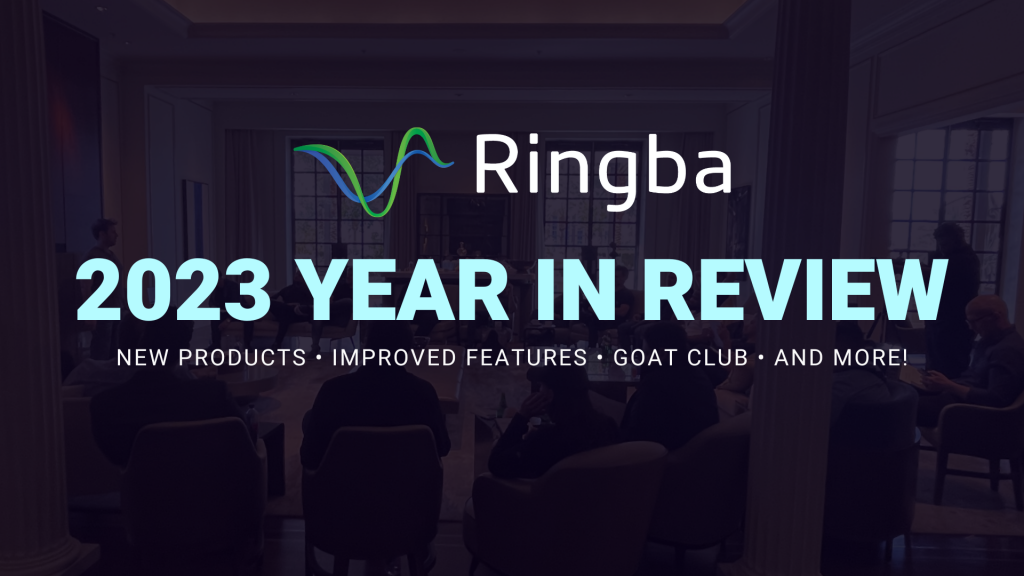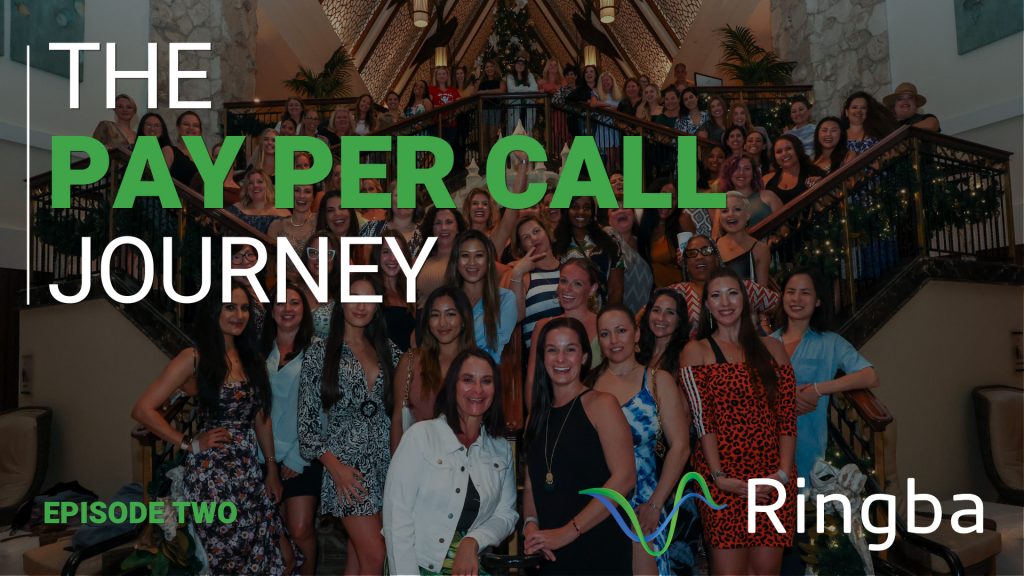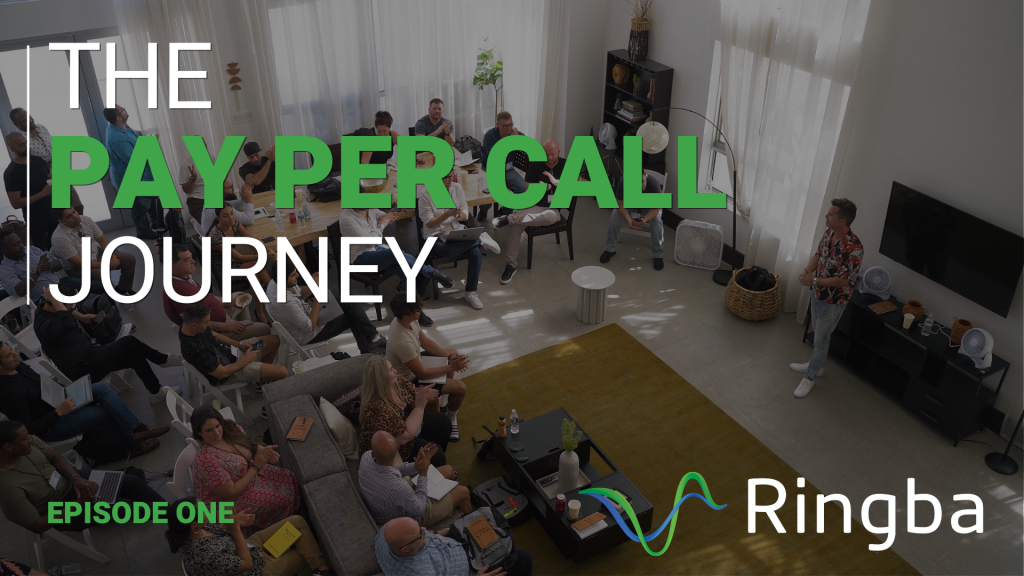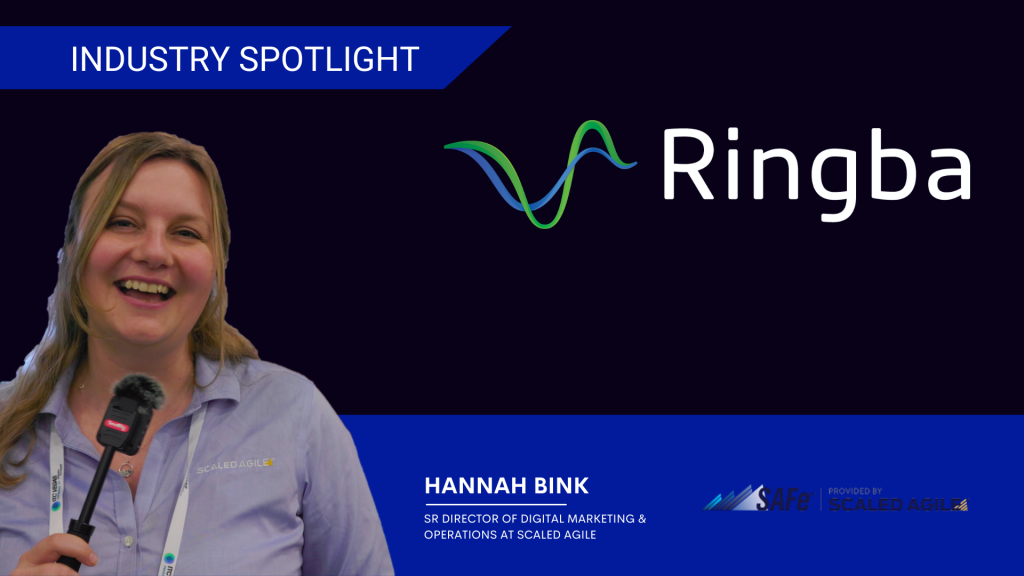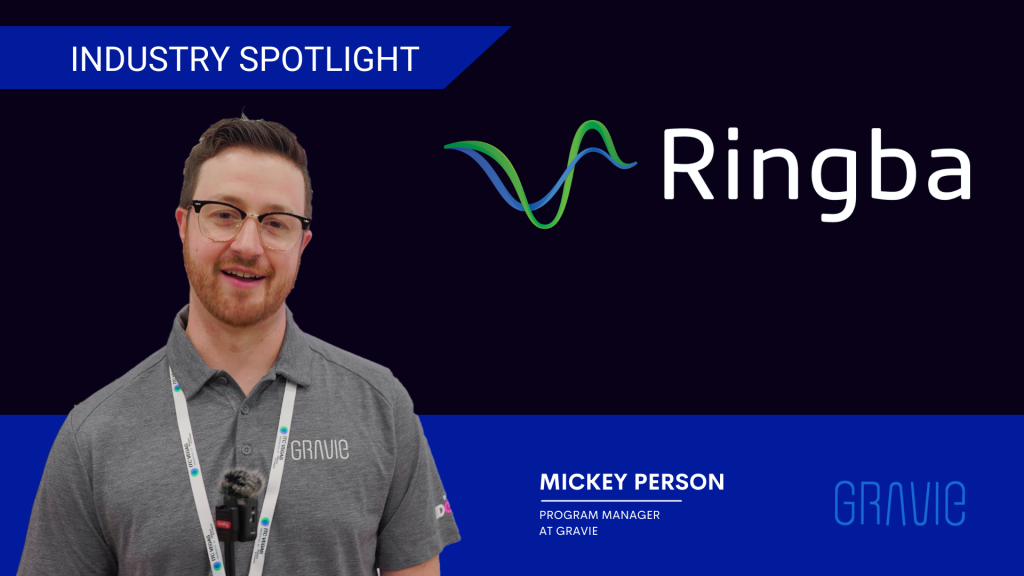Learn where you can find buyers and sellers for your inbound calls, how to work with pay per call networks and why you need to show up to industry trade shows.
Contents:
– Creating a Brand for Yourself
– Working with Pay Per Call Networks
– Online: PayPerCallNetworks.com
– Online: PayPerCallers.com
– Online: Facebook Groups
– Online: Skype Groups
– Online: LinkedIn Groups
– OfferVault
– Trade Shows
– Relationship Building
– Online Cold Calling using LinkedIn
– Online Cold Calling using Facebook
– Online Cold Calling using Skype
Creating a Brand for Yourself
The first thing you need to do when you’re going to conduct business development in the Pay Per Call industry is to create a brand for yourself. It doesn’t matter if you’re going to be an affiliate marketer or you want to build your own Pay Per Call Network, or you want to broker calls. Whatever you’re going to do, you need to create a brand for yourself, AKA, a real business.
What you need to get started:
- Domain
- G-Suite (Google Apps)
- Logo
- Website
- LinkedIn Profile
- Facebook Profile
- Skype Account
- A professional picture of yourself
This is not a complicated process. It doesn’t cost a lot of money. It just takes a bit of work. If you want to see how other companies in the space do it, feel free to check out Ringba’s Facebook page and LinkedIn profile, and all our staff’s profiles and LinkedIn pages. Because it’s vital that you take the time to express to the people you want to do business with that you at least take yourself seriously and doing that is essential. Otherwise, you’re not going to get access to the networks, you’re not going to get replies from people, they’re not going to take you seriously, and you’re not going to be able to create a business for yourself.
To get started, all you need is a few different things. Now, first, you need a domain. It’s not okay to do business with a Hotmail address, a Yahoo mail address or even a Gmail address. It’s just not acceptable. The bare minimum viable level of seriousness you want is your own domain name. Buy one of those. We use Namecheap. It’s great. It’s ten bucks. You get your own domain name.
You need email for that domain. The best way to do that is just to set up a G Suite account. It’s $5 a month, and it can handle all of your emails for you. Use your custom domain name. If you don’t want to use G Suite, you can use something else, but that’s what we use at Ringba. We like it because it’s straightforward. We also get access to Drive and all the other features that come along with Google apps.
You need a logo. It’s easy to get a logo; you spend $5 to $15, and you hire a designer make you a logo that matches your domain name. You could even generate a half-decent logo for free.Then at least you have the beginnings of a brand, and when you send someone an email, they’re going to take you a lot more seriously because at least you took the time to create a brand, and that’s the bare minimum qualifier in Pay Per Call to see if someone is taking themselves seriously.
Next, you need a website. It doesn’t need to be a full website. If you use a template, that’s also fine, but please do not put up a site that has lorem ipsum on it that you have not customized with broken URLs and broken links, and missing information. That’s not going to fly either. A lot of affiliates in the space throw up a template on their domain for their website, don’t take the time to fill out all the information. Honestly, real business people look at that, and they go, “Wow! That’s shady. I’m not going to do business with that guy.”
At the bare minimum, do a splash page that has your logo on it, and maybe a little bit of information about you. If you have contact information, you can put it on there, your address, all that good stuff, but put up some semblance of a completed website. Even if it is bare bones and super basic, let’s make sure it’s complete.
Then you need to make a LinkedIn profile for your company. It is free. It takes about five minutes. You upload your logo to it. You put this company as your company on your personal LinkedIn profile page. It has at least one employee on it, and you put some information in there. You take the time to write a description. Maybe you do your website as a WordPress blog, and you put up a couple of blog posts about Pay Per Call, and then post those on your LinkedIn profile.
I highly recommend cleaning up your Facebook profile, and that’s your first personal Facebook profile and your business Facebook page. You’re going to create a business Facebook page, very similar to your LinkedIn business profile. Put all the same information on that. Get some friends and family to like it. Make sure you have a cover photo, your logo up there.
On your personal Facebook page, you want actual pictures of yourself. You want to make sure that there’s nothing politically motivated on there, that there’s nothing religiously motivated on there. You want a nice, clean, public Facebook profile that says, “Hey, look. That is a real human. He interacts with other real humans.” “He seems like a nice guy,” or “She seems like a nice girl.” You want to make a very friendly Facebook profile page.
If you’re starting from zero and you want to get into this space, I highly recommend that you create a Skype account. When you create that Skype account, please do something straightforward like ‘adamyoung.callexperts’ or whatever your brand is. Please do not use some juvenile handle like ‘mafiaguy227’, okay? That’s not going to go over well in the community. People will notice, and they’re going not to take you seriously.
When it comes to your profile picture, either use your brand logo or use an actual photo of yourself. People want to put a face to your name and you can start to build a reputation for yourself. A strong reputation in the community is key to your long-term success in the industry. If you’re going to use a professional picture or a picture of yourself, it needs to be professional. No photos of you drinking or out partying or any of that nonsense; you simply need an image of yourself that looks professional. That doesn’t mean you need to be in the suit, that doesn’t mean it can’t be fun. As long as that picture is professional and looks good and people can identify you, it will make them a lot more comfortable doing business with you.
When it comes to sending emails, you need to make those emails look and feel professional like a company would in the United States. If you look at this example here, if I were ‘CallExperts’, this is the bare minimum that I would do in an email as my signature. I would put my name in there, Call Experts, my office phone number and my Skype name, and then I would put a disclaimer at the bottom of confidentiality, so it seems corporate because corporate people in the United States do this. It just seems normal.
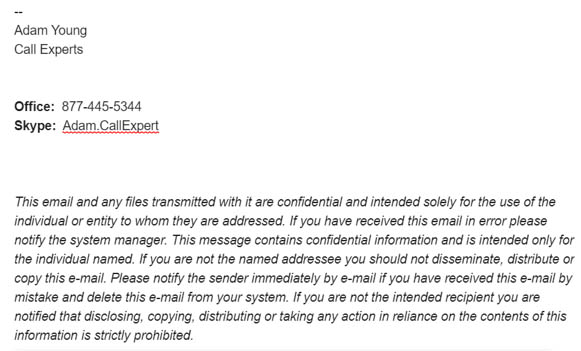
If you don’t have an American phone number, register for Ringba, generate one and forward it wherever you want to go, but you should have a North American phone number that people can call that goes to, at minimum, a voicemail. You can set up that voicemail in Ringba. It’s super easy to do.
Then you have what looks like a professional presence. That way, when you start to communicate with people in the space, they’re going to Google your company name, they’re going to look at your website, they’re going to see you have social media profiles. They’re going to see that you’ve taken the time to at least set yourself up as a legitimate business, and then they’re going to be much more likely to work with you. I know this is elementary stuff, but a lot of people don’t do it. You need to take yourself seriously if you’re going to work in this space.
Working with Pay Per Call Networks
A lot of people complain that Pay Per Call networks will not work with them. A lot of the people that complain are also not American. The reason they’re not willing to work with you is that you don’t take yourself seriously, you don’t have an actual brand or business, you’re not emailing them from a legitimate domain name, and you’re not providing something of value to them. Keyword there, them. You need to show whoever you want to do business with, whether it’s a Pay Per Call network or any other company in any field, whether it’s Pay Per Call or not, what you can offer them.
In the context of Pay Per Call, what can you provide the company you want to do business with of value? This way they’ll at least communicate with you because once they start talking, that’s when you can build a relationship. First, whenever you interact with a Pay Per Call network, you want to give them some background on who you are, “Hi. My name is Whatever. I’m getting into the Pay Per Call space. I have a background in the plumbing and home services industry. I know it well. My family has had businesses in this space. I think I can add a lot of value to your network in-home services because I understand how it works, and I’m starting to drive calls in this space.”
The first thing you want to do is show them you’re a legitimate player, and that’s about how you communicate to the Pay Per Call network and have you taken the time to set up your business.
Then you’re going to want to start a real relationship or friendship with the person that you’re talking to. If you don’t find the people that work at these networks, reach out to them. Ask them about their business, who they are, what’s important to them, what’s working for them, how they got started in the industry, all this good stuff, then you’re not going to be able to create a real relationship or friendship with them. If you don’t create a real relationship or friendship with people on an individual level, they’re not going to work with you.
While you’re doing that, while you’re creating a real relationship with these people, you should do it on a human level. If I were getting into this space, and I wanted to work with a Pay Per Call network, I would reach out to every single employee. It doesn’t matter what department they’re in, and I would reach out to them and say something like, “Hey, I’m new in Pay Per Call. My background is in the plumbing industry. I think I can deliver a lot of value because my family’s owned businesses in that space, and I’ve spent 15 years in it, and I’m very good at digital marketing. I’m trying to create relationships with people at Pay Per Call networks. Do you have any tips or tricks on how I can get started in this space or best practices for me working with your company?”
You start asking questions like that it shows them you’re serious and that you want to learn about the space and learn the best way to work with them. That provides value because if they know that you care, they’re probably going to work with you or at least give you a shot. That’s all you’re looking for if you’re new. You’re looking for a chance. That shot is not necessarily going to come easy. These people, again, don’t owe you anything.
You need to take the time to tee this up in a way that they’re going to be willing to invest the time with you, especially if you’re new.Throughout this process, though, don’t forget to sell. What I mean is you’re selling yourself. You’re saying, “I’m a smart guy,” or girl. “I’m willing to work hard. I want to learn everything I possibly can,” and asking them questions about best practices when working with them is selling yourself as a legitimate player. The entire time you communicate with a Pay Per Call network, you should be marketing yourself.
Make contacting you easy. What I mean by that is set up an email that makes sense. Put your phone number in it, put your Skype in it, put all your contact information in it, and do it professionally, so that it is effortless for these people to contact you. If they don’t know how to reply or how to contact you or you don’t give them options, well, guess what? They’re not going to reach out.
Get spell check and spell things correctly. If you type “what” as “wut,” not a single Pay Per Call network representative is ever going to take you seriously. They’re going to go, “That guy is an idiot. He’s not even taking the time to spell words properly. Why should I take them seriously?” Maybe that flies in other countries. If it does, it’s okay. I don’t care. Here, we look at how you spell and how you communicate with us and then judge you. We judge the heck out of you by how you communicate.
If you’re not going to communicate clearly and concisely and take the time to use proper spelling, good grammar, punctuation, no shorthand, well, guess what? We’re probably not going to reply to you, and you need to wrap your head around that because most people in the space that I see that aren’t making progress and complain that Pay Per Call networks won’t talk to them talk like idiots. They don’t take the time to communicate well. They’re like, “Oh, this guy doesn’t take himself seriously. He won’t even spell words correctly. I do not trust this person.” If they don’t trust you, they aren’t going to work with you. They’re not going to do business with you. They’re looking at that going, “Oh, this is a fraud problem. I’m not going anywhere near it.”
Maybe you’re not a fraud problem, perhaps you genuinely care about the business, and you want to create something great, and provide for your family, and build a real business. Well, step one is learning how to communicate correctly, and then taking the time to do it. Whenever I write a letter that’s important to either our team members, a client, my wife, anybody, I write it, and then I proofread it out loud. I read it to myself out loud to make sure I didn’t have any spelling errors or any mistakes in it or anything like that. I’ll do it a couple of times, not just one. I’ll proofread it once, twice, three times.
If you’re writing a cold call letter to a network or someone else, you need to make sure that you communicate effectively, you show them something of value, and then you get all your English done correctly. If you don’t communicate well, you’re probably not going to be successful in Pay Per Call. And if your messages sound like a 13-year-old wrote them, no one is going to take you seriously.
When I wanted to meet the CEO of every single Pay Per Call network, I had to cold call them. I didn’t ask for introductions. I just did it the hard way, the old school way. I have to tell you; I got almost 100% of them to reply. How did I do that? Let’s take a look:
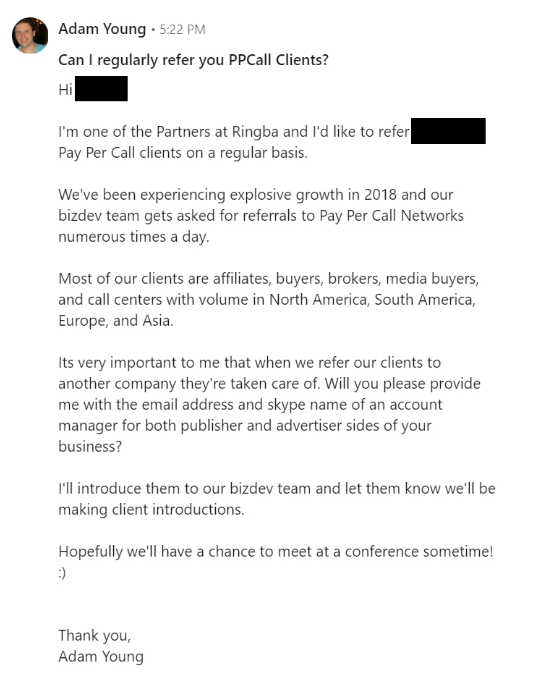
First of all, I did it on LinkedIn. You can see that’s my pretty face right there. My profile picture is me. My name is me. The first thing I did in the subject was offer them something of value, “Can I regularly refer you Pay Per Call clients?” Who’s not going to reply to that? “Wait a second. Who’s this guy? Why does he want to refer me business? That’s an exciting proposition. Okay. I’ll give him 30 seconds. I’ll open it.”
100% of them that received it opened it and read it, which is an incredibly high conversion rate. I said, “Hey, buddy. This message is not about me; it’s about you.” So, they’re like, “Oh, okay. I’ll keep reading.” I’m selling the entire time. “We’ve been experiencing explosive growth in 2018, and our business development team gets asked for referrals to Pay Per Call network numerous times a day,” which is accurate, and I explain to them why I can do this for them.
“Wait a second. How can he refer me Pay Per Call clients regularly? Oh, okay. He’s one of the owners at the platform, and the platform’s been growing rapidly, and his people get asked multiple times a day for referrals. Okay. Yeah. I want to keep reading.” “Most of our clients are affiliates, buyers, brokers, media buyers, and call centers with volume in North America, South America, Europe, and Asia.”
What I’m saying here is that we got tons of clients. They all do all sorts of different things. We got publishers; we got buyers; we got all different types of people all around the world. I’m showing them that our business has something of extreme value that they’re interested in, that covers all areas that they might get focused on.
Then I show them who I am. It’s crucial to me that when we refer our clients to another company that they’re taken care of. If we refer someone to you, we want you to at least reply. We want you to talk to these people. Otherwise, it makes us look bad if we don’t have a two-way referral. “Will you please provide me with the email address and Skype name of an account manager for both publisher side and advertiser sides of your business?” So, I’m asking for a straightforward thing. “Please introduce me to the people you want us to refer business to.”
That’s the only thing I ask for. “I’ll introduce them to our biz dev team, and let them know we’ll be making client introductions.” Then hopefully, I end with a personal connection. “Hopefully, we’ll have a chance to meet at a conference some time. Thank you. Adam Young.” I click my contact information on here, but I gave him my personal cellphone number, and I gave them my email address, and I gave them my Skype name.
I got almost 100% reply out of the CEOs of every single Pay Per Call network on earth with this message. When people tell me that Pay Per Call networks won’t talk to them, I think to myself they’re crazy because I was able to cold call all of them, no questions asked. They had no idea who I was. That was in April of 2018. It’s January 2019 now. Since I sent out these emails, these messages on LinkedIn, we’ve sent over 10,000 referrals to Pay Per Call networks. We’ve facilitated millions of dollars in business, and for the most part, I’ve met every single one of these CEOs in-person at a conference, introduced myself, and some of them I call close personal friends now.
This is how you start a relationship. It’s not about what they can do for you. It’s what you can do for them. If you don’t communicate that way, well, guess what? You’re probably not going to get a reply because these people get cold called all the time of people who want something from them. It’s infrequent that someone emails them and offer something of value, but it’s complicated to do. It’s certainly not. It’s just taking the time to write a lovely well-put together letter, and then read it out loud to yourself, proof it, and then make sure that it delivers something of value, and you will have a much higher chance of getting a response.
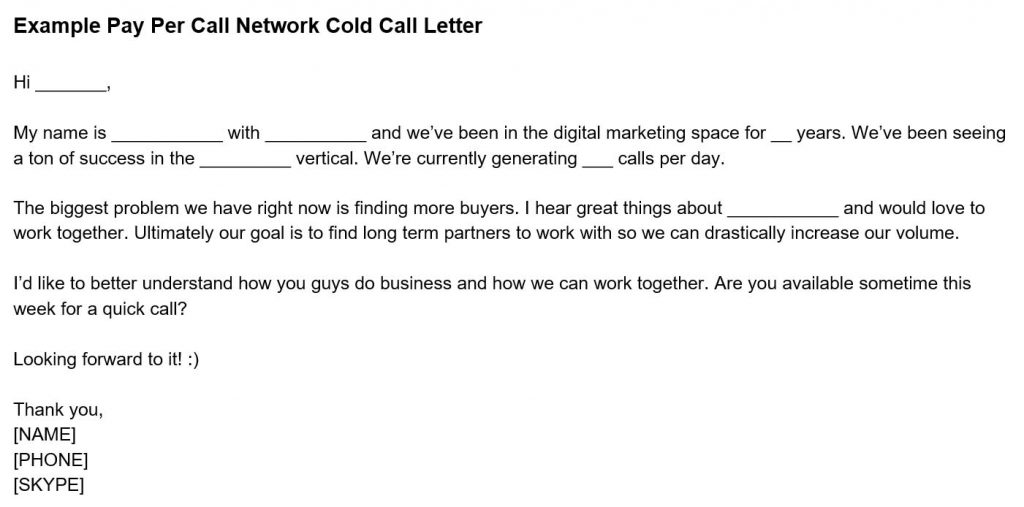
Here’s a letter for you that’s a little bit more tailored to an affiliate. Again, the same principles apply. “Hi,” person’s name, Mr. Account Manager, whatever. Most people, you can address by their first name. You don’t need misters in this space. It could be, “Hi, Bill. My name is Adam Young with Call Experts, and we’ve been in the digital marketing space for one year,” 15 years or whatever it is. “We’ve seen a ton of success in the plumbing vertical or home services verticals. We’re currently generating 300 calls per day,” 22 calls per day, ten calls per day. If you’re only generating a couple, say ten high-quality calls per day. If you’re not generating any calls, well, you need to find another way to show them that you could be a valuable partner.
The biggest problem we have right now is finding more buyers. A compliment goes a long way, guys. I hear great things about Call Experts and would love to work together. Ultimately, our goal to find long-term partners to work with so that we can drastically increase our volume.
Anyone who takes the time to write a letter like this and to say longterm partners in it is probably really looking for longterm partners because the people who write letters that are about just making a quick buck, regardless of how they do it, write crap letters. They don’t say things like this. They don’t communicate this way. You should communicate this way.
“I’d like to understand better how you guys do business, and how we can work together. Are you available sometime this week for a quick call?” This line is critical because you’re saying you want to understand what’s important to them, how they do business, and how you can fit into how they do business. That’s an excellent opener for a relationship, “I want to learn about how you guys do business, so I can tailor what I’m doing to make it best for you.”
You’re saying, “I care.” It’s that simple. All this is about is communicating to the company that you care. It’s that simple. “Are you available sometime this week for a call? You want to close?” This is a closing statement. “Are you available?” When a timeline is built into it, you want to talk to them, sometimes in the next week, and then, “Looking forward to it.”
I’m assuming the close. I’m assuming they’re going to reply to me. I’m assuming we’re going to set up a call because I take myself seriously, and then I finish that with my first and my last name, my phone number, my Skype, my email, my signature, my confidentiality notice, my logos in there if it’s an email. I’ve done an excellent job of presenting myself as a legitimate business that gives a crap, and that’s what you guys need to do.
Online: PayPerCallNetworks.com
If you want introductions to pay per call networks, Ringba owns PayPerCallNetworks.com. We’ll make those introductions for you, but you have to follow the rules. We screen every submission, and we’re looking for professional and high-quality referrals. What’s that mean? No Hotmail, no Yahoo, and rarely, Gmail. We will only authorize a Gmail if you are a Ringba customer, we know exactly who you are, and we know that your calls are legitimate.
If you submit some crap like this, which came through yesterday: somethingbadboys@gmail.com, again, not US-based, guess what? We are not making introductions for you. Nope. Not a chance. I’m not risking my relationships with all those Pay Per Call network because you won’t take the time to at least look professional. It’s not happening. You guys need to pull your heads out of your butts because this happens all the time and create a professional demeanor for yourself. Otherwise, we flush these. We’re like, “Haha. Not happening. Not introducing you. You don’t get a chance, definitely not with our reputation.”
This happens every single day of the week. We keep a log of them because we think this is hilarious, and it’s not helping anybody, especially you guys. Start to take yourself seriously, and people will begin to be willing to work with you.
Online: PayPerCallers.com
If you’re getting into this space and you want to meet other people that are like-minded or getting into this space, register for Pay Per Callers. The whole masterclass is on here. We’ll discuss it with you. I’ll even communicate with you, and help guide you through the process of getting started, but the first thing to getting started in this space is creating a brand for yourself as we said, and building a reputation for yourself.
How do you do that? You communicate with the community, even if you’re brand new, even if you go introduce yourself and you’re like, “Hey, I’m from Germany, and I’m getting into the Pay Per Call space. My background is online marketing. I’ve done some lead generation, but I am interested in calls. I’ve done a bunch of research in these verticals, and would like to chat with new people, and to talk about our journey together.”
You go post that on a forum, and next thing you know, people start hitting you up, and they’re like, “Hey, I’m also new. Hey, I’m also working in Pay Per Call. Hey, have you tried this? Are you having issues with that?” You create relationships and friends in the space, and then people see you publicly communicating, and then they start to take you seriously, or they start to at least trust you because you’re putting yourself out there. That is how you build a relationship in the space with companies you want to do business with. You put yourself out there.
Once you make a little bit of progress in this space, I highly encourage you to add value wherever you can. Trust me, teaching and adding value, it’s worth the time. It feels good. I’m enjoying myself right now, and I’ve been doing this for hours. I know that people will see what I’m doing here, and it will help them create businesses and a better life for themselves, and that feels good. If you learn something in Pay Per Call, go to the forums, add value, reply to people with thought-out replies, proofread your responses, write guides, training courses, and then publicly give them away.
Also on the forum, you can post for types of calls you have or need. If you’re going to do that, include clear contact information, “I am interested in 100 flight booking calls daily.” Okay. “We’ve been in business for four years. We have experience in the space. Here are our payment terms. Here is my contact information.” Lastly, please proof your post. Proofread your post every single time because when people see how you communicate in writing, they’re judging you. If you do a piss poor job, they’re not going to trust, and they’re not going to take you seriously.
Online: Facebook Groups
Ringba owns the world’s largest community of Pay Per Call Professionals. All you have to do is apply, and the same thing goes. Some people when they apply, they don’t answer our questions. Guess what we do? Click decline. If you can’t take the time to answer those three questions we ask you, we are not going to let you into your communities because we moderate them all. If you can’t take the time to do that, well, guess what? We can’t take the time to monitor your potential bad behavior.
Otherwise, we’re like Switzerland. We let everybody in until they do something wrong, and then kick them out. We don’t discriminate. We judge you based on how you communicate, and whether or not you fill out three simple questions (the last one is yes or no!)
These Pay Per Call Networking Groups on Facebook are geared towards buyers and sellers of calls. Almost all of the Pay Per Call networks are in our Facebook groups. All their account managers are in the groups, tons of affiliates, and brokers. I’m talking about thousands of people are in there, and they may not all communicate directly, but they’re all reading it.
This is a great place to find new contacts and business partners and people to trade calls with or also to share your journey, communicate and ask questions with because the most prominent experts in Pay Per Call are all in these Pay Per Call groups on Facebook. When you ask a question, people will answer it. They’ll communicate with you, and they’ll also do a lot of business in these places.
Take a look at some of the excellent examples of real pay per call pros reaching out to the community and getting responses from actual buyers looking to partner with them.
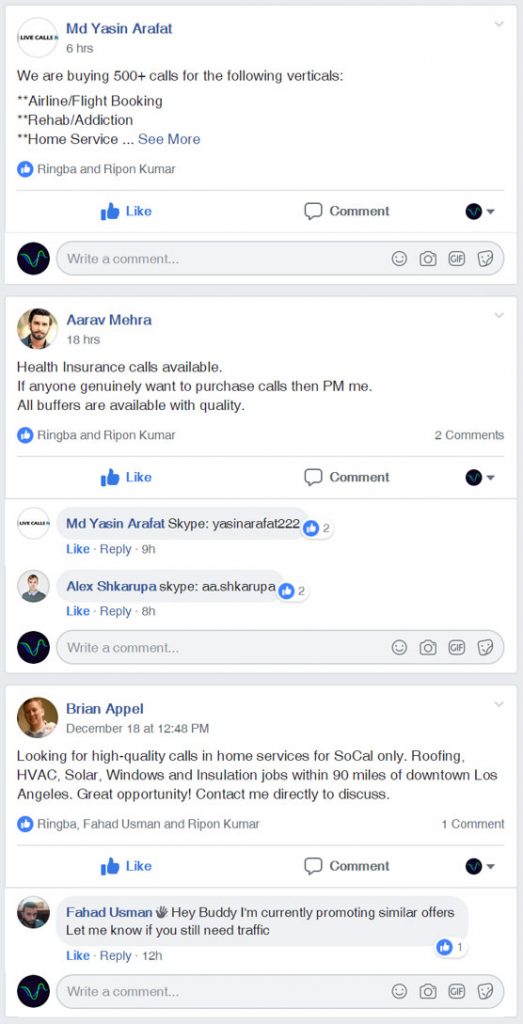
You can see right here from my example that the people who communicate clearly, and I put some non-Americans in here to show you how this works, and why these people are able to do it, why others aren’t because I want you to understand that, yes, you can put live calls network or whatever as you’re low. You put your logo as your name, and then you use your real name, and people will work with you. Here you go, “We’re buying 500 calls for the following verticals, airline, flight booking, rehab and addiction, home services, et cetera.”
Next guy, not an American, “Health insurance calls available. If anyone genuinely wants to purchase calls, then private message me. All buffers are available of quality.” You’ll notice here that this guy took the time to use complete sentences, punctuation, grammar, all that good stuff, and to say what he wants clearly. Then people replied with their contact information so that they can do business. It’s that simple. This isn’t rocket science. Just communicate, say what you need professionally, and then professionals will come work with you.
Then lastly, here’s Brian, “Looking for high-quality calls in-home services for Southern California only, roofing, HVAC, solar windows, and installation jobs within 90 miles of Downtown Los Angeles. Great opportunity. Contact me directly to discuss it.” There is nothing in there but precisely what he wants and needs.
If you can provide that, he’s willing to do business with you. There’s no question what Brian needs in that post. There’s no nonsense. It’s clearly communicated. It’s precisely what he needs, and he gets replies. “Hey, buddy. I’m currently promoting similar offers. Let me know if you still need traffic.” That’s it. That’s it, and then they communicate together.
What all these people have done is communicated clearly and concisely, proofread what they wrote, and made sure that other professional will understand it in a way that they’re used to. They have adapted into the marketplace. They’re not expecting the market to adjust to them because that would be insane.
Online: Skype Groups
We have the biggest Skype group in Pay Per Call. You’re welcome to join it. I want to be clear that you need to create an identity or brand here. If you enter the Skype group with some cryptic name that’s nonsense like Adwordz with a Z, Pro999superseller or some nonsense, we’re kicking your butt out. Use your real name, and show the community that you’re a real person.
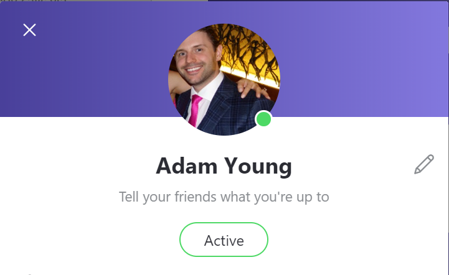
I eat my own dog food here. Here’s my Skype profile. Again, not rocket science. It’s a picture of me professionally with my name. That’s it. This all this requires, and you had some people who can’t pull it together. We’re not talking about script kitties from 1999 that are trying to be cool on the internet. You need to be professional. You need to use your real name. You need to communicate clearly. If you look at this thread here, you’ll see that Robert, and Gerard, and Ana, and Kevin, and Farhan, which is literally about the bottom of the barrel we will accept in the group here.
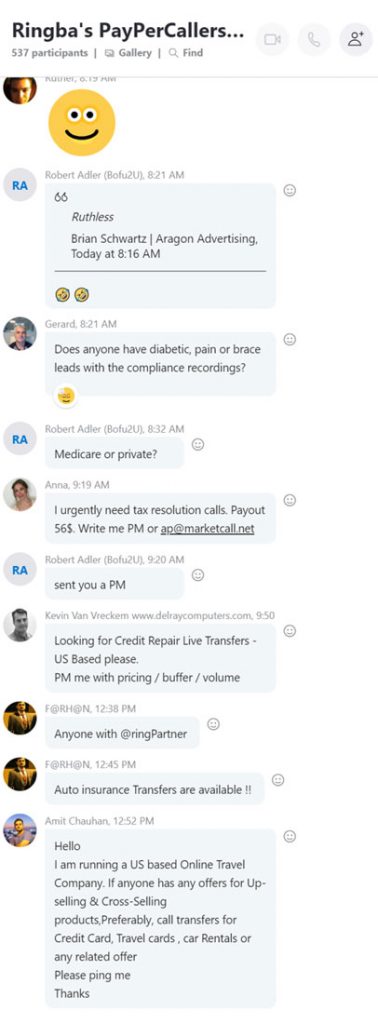
Put your real letters in the name, seriously. This is barely okay. By the time you watch this, we probably aren’t going to allow it anymore or Amit here. It’s the same kind of thing. They’re communicating clearly. Does anyone have diabetic pain or brace leads with the compliance recordings? I urgently need tax resolution calls. The payout, $56. I mean, there’s nothing to this, guys. You need to communicate clearly.
How do you join? Go to our Full List of Pay Per Call Communities, find one you want to join and click it! It’s that simple. How to interact? Interact professionally, and clearly. Don’t run around talking crap for no reason. Don’t argue with people. There are almost 600 people in the group right now. Not everyone wants to hear your whining and complaining.
How to address a company? Real simple. “Hi, Pay Per Callers. Is anyone from X network in the group? I want to run your tax offer.” That’s it. That’s all you get. I don’t want to see any complaining in the group that you weren’t accepted into Pay Per Call networks. If you do that, we’re kicking you. If you don’t take the time to read this lesson and pull your crap together, well, you’re not welcome.
What not to do? No spamming. You post a link to just about anything; you’re getting the boot — no service providers. We do not allow service providers to advertise in this group. That includes Ringba. Ringba does not promote in this group. We don’t tell people about our products or services. We don’t allow other people to do it as well. It’s a forum and a safe place for people to conduct business. It’s not put together so that other people can reap the advertising value of our hard work.
Nothing will get you ejected faster than advertising a product or service. When you do that, we don’t just kick you from the Skype group; you get banned across all of our communities. We don’t care. If you want to advertise your product or service, go to PayPerCallers.com, and do it in the product or services section that we set up, so you can do it.
No private message spamming. A lot of people in this group have personal relationships with Ringba team members. If someone reaches out to them and continually hits them with spam because they beat everyone in the group with nonsense, we remove them immediately. If you private message someone in the group a link or anything promotional related not to calls, you’re out. Not happening.
No trashing people. If you have a dispute or an issue, you can say it politely in the group, but this is not a forum for you to run around and try and hurt people or bash reputations or anything like that. If someone hasn’t paid you on time, you’re welcome to tell the group that you haven’t received a payment on time, and you would like to get in contact with someone at that company, but you’re going to give them a fair chance to resolve it. You’re not going just to run around saying they’re a terrible company or some nonsense like that. Otherwise, you will also get the boot.
Online: LinkedIn Groups
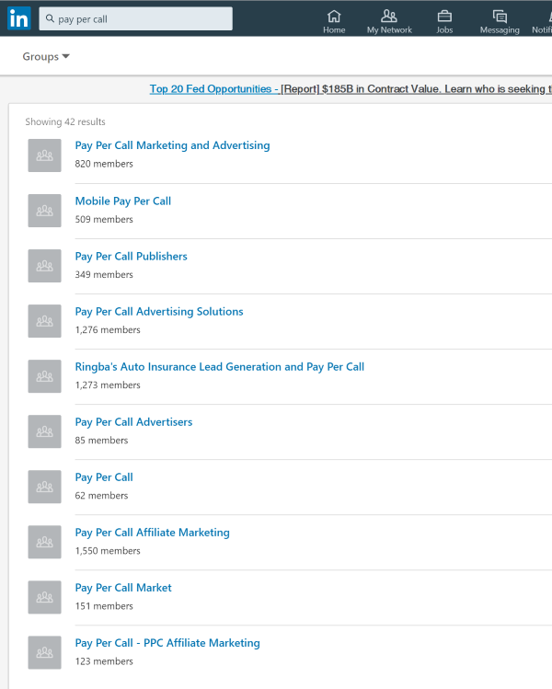
LinkedIn groups, these are a bit less active, but they’re good because a lot of people conduct business on LinkedIn. They’re great for making new business connections, great for finding buyers and sellers and other people in Pay Per Call. You can search Pay Per Call on the top on LinkedIn, and you’ll get a list of people who have Pay Per Call in their profile. Just start messaging them. That’s it. Do it with a nice letter like I showed you.
Pay for LinkedIn Premium. It’s 70 bucks a month or something. It’s an investment, but in-messages are amazing. Most of the Pay Per Call network CEOs that I cold call were in-messages. You can’t do that unless you have a paid account. I highly recommend getting a paid account. I don’t own stock in LinkedIn. I’m just saying that it’s a good idea.
Again, the best way to interact is to add value. It’s to tell the person why you can bring them something of value, and you will get a reply. Don’t spam people. Don’t send crappy messages. Don’t spam people’s service provider stuff or links or any of that because you’re going to generate a reputation for yourself as a spammer, and then no one is going to take you seriously.
Then make sure your personal LinkedIn profile is up-to-date. At a bare minimum, it’s to show your current company that you’re using to promote Pay Per Call should have a link to that page with the logo on it. As well as a description of what that company does, even if you’re an affiliate, “I run an affiliate agency for Pay Per Call, and I’m working in these spaces,” blah, blah, blah. It doesn’t matter as long as you put something in there.
You should describe yourself, and put a little introduction in there. You should show some previous jobs, your degree, where you went to school, few things that interest you, and your profile picture, again, should be a real picture of you with your real name. Guess what? People will take you seriously if you’re real with them. It’s that simple.
OfferVault (OfferVault.com)
If you want to find offers and you want to see which networks to work with that are working in your space, OfferVault.com is a great place to do it. Most pay per call networks have a good amount in their offers listed there with payouts and other details that give you the ability to search, compare and find PPCall offers in specific verticals.
When you find one, reach out to the network, and tell them precisely what you want, “Hey, I saw that you had a final expense life insurance offer on OfferVault that pays $26. Is that offer still valid? I want to work with you on it. I have final expense calls. What are some of the terms of your offers or some of the rules of this campaign, so that I can see if my traffic works with how your offers work?” It’s that simple.
Try to schedule a call, whatever, but again, communicate clearly, and always under all circumstances proofread your messages. It’s that simple.
Trade Shows
I want to spend a little bit of time on this because trade shows are near and dear to my heart. My business partner that I’ve done business with for a long time now, five-plus years, and who I’ve known for over a decade, I met at Ad:tech in San Francisco. He’s one of my best friends, family, and now my business partner, and we do a ton of business together. We created Ringba together. I met him at a trade show.
I can tell you right now that the vast majority of my friends are people I met at trade shows, whether I do business with them or not. I have so much fun at trade shows. I meet so many cool people, so many smart people that I’d go to all these things. We take Ringba to them all. We spend a lot of money at trade shows because they’re amazing.
Some people are very negative on trade shows. They’re like, “It’s a lot of work. I got to man a booth,” blah, blah, blah. Well, those people are just toxic. Trade shows are awesome. They’re awesome. They’re the best place to create lasting relationships in an industry. First and foremost, if you show up to a trade show, we automatically take you seriously. It doesn’t even matter if you’re like, “Yeah. I’m brand new. I don’t even have a single phone call a day, but I showed up because I want to learn.” I’m like, “Oh, well, crap. This guy is serious. He traveled to a trade show where he doesn’t live, got a hotel room, paid to be there. He’s acting professional, being honest with me. Well, what can I do for you, sir?”
You can build your entire business from a trade show if you show up from nothing to multimillionaire trade shows. I’ll tell you what, a lot of my friends that own a lot of the companies at these trade shows, the most prominent sponsors at all these industry trade shows for affiliate marketing and Pay Per Call are some of my good friends. They started their business by showing up at trade shows, and now, they own some of the biggest companies in the space five, ten years later or whatever it is.
If you’re not going to go to a trade show, I don’t take you seriously, and other people aren’t either. Show up. That’s the minimum requirement for a trade show is just being there. If you can’t afford the pass, wait outside the trade show and try and talk to people, honestly, seriously.
My business partner, Harrison, when he started in the space, was 13 years old. They wouldn’t even let him in because he wasn’t 18 years old. He bought the pass, but ended up just parking himself outside the door because he couldn’t get in, and then created millions of dollars of business as a teenager just standing outside the door in the lobby. If he can do it, you can do it, but at the bare minimum, you got to show up.
Next, show up prepared, please. Understand who you need to talk to, who’s at the trade show, why you’re going to be there, what your goals are, why you’re talking to people, what you need, what you can give, and all those things. You need to think about it before you show up. Make a bullet list with a bunch of goals, what you want to achieve, why, who you want to meet. Make a list of who you want to meet. Don’t have any expectations.
If you walk up to a booth and I’m personally there, and I am a lot, and you’re like, “Hey, Adam. I really would like to meet the CEO of whatever company.” You tell me your story, and I don’t feel comfortable, I’m going to be like, “No. Sorry. Can’t do it.” Maybe I’d tell you why perhaps I don’t. It doesn’t matter, but don’t have expectations. It’s not fair to expect something out of someone you don’t know.
Maybe the first day, it doesn’t go well. Perhaps I have a meeting; I got to run. I can’t help you. Perhaps you be persistent and come back and talk to me again, and then maybe you’d get your way, I don’t know, but don’t have those expectations.
Treat people with respect. Just because they’re there does not mean they owe you anything. It doesn’t mean they have to do business with you. You should treat them professionally, with respect, as nicely, use please, thank you, shake hands. Treating people with respect, you need to treat yourself with respect, especially if you’re new. Dress professional, even if you will see other people who don’t.
As humans, we judge people immediately by the way they dress. I mean, I’m not showing up to a trade show in a T-shirt and some yoga pants, but I’m at home right now in my home office, so I can do whatever I want. It doesn’t matter. I’m giving something of immense value, so I’ll dress however I please. At a trade show, you’re going to see me in a jacket, in a nice shirt. I’m going to look professional because I’m conducting business, and the people I’m doing business with are going to judge me by how I dress and present myself.
If you’re ambitious and you don’t like wearing a suit, I’m cool with that. Hit up a company like Queensboro or Google it yourself, and get your logo embroidered on a polo shirt, and then people will take you seriously. A lot of our team wears polo shirts or Ringba T-shirts, and we don’t have a problem with that.
Our rule for trade shows is that all of our people at trade shows either need to wear a jacket and a collared shirt, so a suit jacket and a collared shirt or Ringba-branded apparel. If they want to support the company brand, and they want to be a little bit more comfortable in a polo, being in a polo and jeans, I’m okay with that as long as they’re professional. Professionalism is repping your brand or dressing like a business person. Those are your only two options. Otherwise, I wouldn’t recommend coming.
Have a plan. Seriously, have an idea. We’re going to talk about how to build a plan in a minute, but you need to know who you’re going to talk, who you want to find, and why, and you want to have goals so that you can accomplish them because this costs money. You have to have goals at a trade show for what you want to get done, and then you want to see if you meet those goals, and that’s part of a plan.
Have professional business cards. It costs 25 bucks on Upwork or Fiverr to get someone to do a design. It costs virtually nothing to have those cards printed. There’s a printer in Las Vegas called Digital Insights Printing. These guys are amazing. They will print the same day just about anything. They never miss a deadline. I’ve been using them for years. They never miss a deadline. They take PayPal. They communicate over email, phone, however you want to do it, and they can make just about any promotional material. I don’t own this business. I’ve never even met them in person. All I know is they’ve always taken care of me for years, and I highly recommend them, and they’re super cheap.
Then if you have critical meetings, you need to get done, and you’ve been communicating with people, pre-schedule them, so you can guarantee you get the time you need. If you want to talk to me and it’s vital for you to speak to me, and you don’t schedule a meeting, there’s a high likelihood you’re not going to get your chance because I got meetings all day from people who took the time to schedule them. I don’t miss meetings. That makes me look bad if I do. When I promise someone my time, I give it to them because it’s the right thing to do.
You should talk to as many people as you possibly can, connect with them on LinkedIn, create as many industry relationships as you can, so that as you build your business, you’re like, “Oh, yeah. I need to talk to those guys. I need SEO services now,” or whatever. “Oh, yeah. Cool. I have their contact, and we’re connected on LinkedIn. I can reach out. I have a relationship.” So, building relationships is an investment in your future. You should take the time to do it.
By the time a trade show is done, they’re two or three days long; you should be physically exhausted. I mean, physically exhausted. I am. I get no sleep. I don’t party. I don’t drink. We throw a lot of parties, but I don’t do any of that because I have to invest so much energy into it that by the time I get home, I walk in the door, and usually fall asleep. That’s how hard you should go if you want to make a lot of money leveraging trade shows.
Always find and attend industry events. At Affiliate Summit, Ringba threw two, not one, but two Pay Per Call events. Over 1500 people in Pay Per Call RSVP’d between the two. Tons of connections were made at those events. Also, they’re a lot of fun. We did open bars and food, great music, great venues. I mean, they’re a lot of fun to come to those events, and you get to mingle with people on a casual environment.
I’m much more likely to make a referral at one of these networking events than I am at the trade show because at the trade show, I got to walk away from the booth. At the networking events, everyone is just chilling, making friends. Here’s the thing. When you’re at an industry event, it’s okay to ask people what they do. It’s okay to talk to them about business if it’s what they’re there for, but be cool about it, and make a friend, too.
Don’t be scared to reach out and meet CEOs. When I was young, I was a teenager, I went to my first industry trade show, and I was concerned. I was like, “Man, I need to talk to the CEOs of some of these companies so that I can pitch them my ideas.” I’m like a little kid, a teenager. I thought that these people were not approachable.
Don’t be scared about reaching out to anybody. At the same time, don’t have expectations. Just because you reach out doesn’t mean they’re going to talk to you. A simple way to look at those odds is looking at the size of their company. If they’re a CEO of a company that has 300 people who’re at a trade show, the likelihood you’re going to get five minutes with them is low. They have 300 employees. They got tons of deals they’re working on. It’s unlikely.
At these trade shows, where a lot of people that work in calls have five to 25 employees, the CEOs are entirely accessible, and you should reach out to them and create those relationships because those are the people that have the most information and are the most successful in the space. They’re the ones who can teach you the most.
Suggested Trade Shows for Pay Per Call
Here are some suggested trade shows for Pay Per Call. These are if you’re new and you want to meet a bunch of networks or a wide assortment of audiences when it comes to digital marketing and Pay Per Call:
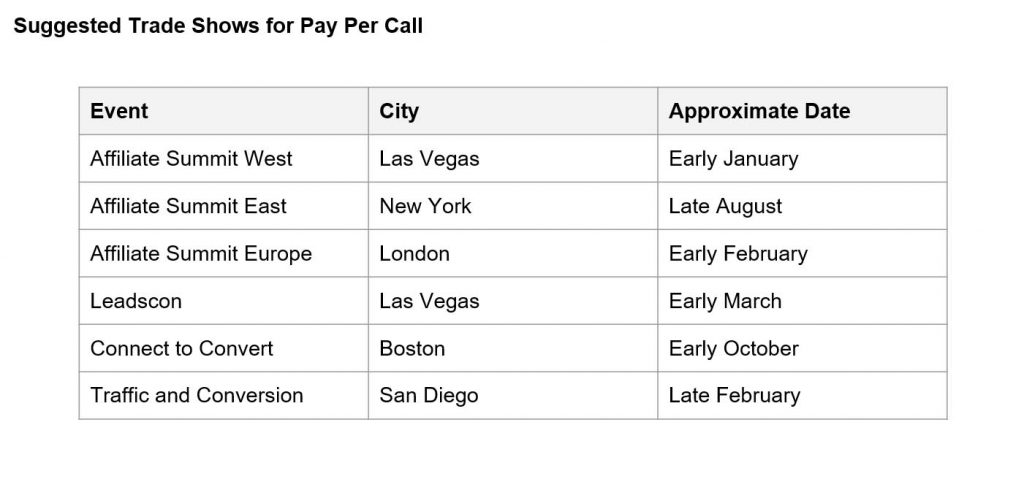
Affiliate Summit West in Las Vegas is held at the beginning of every year. Affiliate Summit East in New York. It’s a little smaller, but if you’re on the East Coast, it’s an easy trip, a lot of call people go. If you’re in Europe, there’s Affiliate Summit Europe which is not as popular for Pay Per Call specifically.
So, if you’re brand new and you want to go to a trade show, I wouldn’t recommend that one as your first go. You got to fly from America, and travelling abroad is a significant investment. You’re going to need to know how to work a trade show and have some relationships before you start traveling around the world, especially if you’re not turning your profit because these are expensive investments.
If you got a lot of money behind you, and you want to accelerate your progress, go to as many of these things as you possibly can. LeadsCon, LeadsCon Las Vegas is probably the best trade show for general Pay Per Call. That is the most players in Pay Per Call and service providers, and networks are going to be at LeadsCon. I highly recommend that. Connect to Convert is LeadsCon Boston, smaller, but also a good show. I spend a lot of time with higher level people at Connect to Convert because only the more senior level people ended up showing up because it’s a smaller show. It’s precious for me, and I highly recommend it.
Traffic and Conversion Summit is for marketers, entrepreneurs and affiliates who are all trying to drive traffic. That’s in Downtown San Diego in late February. I highly recommend that one, too, because you can meet a lot of like-minded people and learn a lot of strategies around how Pay Per Call works and how you can generate traffic for it. There’s going to be fewer buyers and fewer networks at Traffic and Conversion, but it doesn’t mean there’s less value there. It all depends on what your business model is, and what you hope to get out of the space.
How to Work a Trade Show

How are you going to work a trade show? So, this is a picture of me (Adam) with Dan and Sean, two of our biz dev team there. You can see that Sean’s dressed professional business casual. Dan’s got a Ringba T-shirt on. Both are acceptable for us, and it works well. You don’t necessarily have to do a suit. You need to look professional, groom yourself, all that good stuff.
You’re going to set up a game plan. How do you set up a game plan? First thing you do is determine your goals. What are your goals for this trade show? What do you hope to get out of it? That’s step one. Once you write those out, and I do mean write them out, you should write down your three top goals on paper so that you can commit them to memory. You need to find a list of company targets that you need to talk to.
Before these trade shows, they all release exhibit hall and meet market or whatever they call it maps of the actual companies that are exhibiting at the show. Step one is making a list of company targets that have invested in exhibiting at the show. If a company invests in exhibiting, they’re spending a lot of money. They’re flying their members out. They’re creating a booth. They’re paying for that space. They’re putting everyone up in hotels. It costs tens of thousands of dollars to exhibit at even a small trade show with a small booth.
It’s important to realize that because if someone is willing to spend that kind of money to exhibit at a trade show, they’re probably a legitimate company, you want to talk to them. Not all companies in Pay Per Call exhibit, not even all the big ones exhibit. Some of the biggest companies in the space do not exhibit, but they do have representatives that are at the show. You want to make a list of company targets based on the exhibitor list, but you also want to make a list of companies that you like to talk to, and then you’re going to have to reach out to them separately to see if they’re going to the show.
If you hit up someone on LinkedIn, and the subject line is, “Are you going to ASW?” or “Are you going to LeadsCon? I’d love to meet,” you’re going to have a high return rate because you’re saying, “Yeah, I’m a professional, you’re a professional. You want to hang out in Vegas?” People are pretty open-minded about that. Showing up, again, is half the battle.
Download the app. Most of these trade shows have their own trade show app. Inside that app, they’re going to have all different types of features like exhibitor lists, other attendees. You can create a profile in there. If you create a profile, use your real name, use a professional image. Put your company website and information in there. Then you can start reaching out to other people.
Sometimes these apps even have exchanges, “I’m looking for X. I’m looking for Y. I want to accomplish these goals.” You see people that say these things. You can write yours as well, and then you start to make connections before the trade show, and then you schedule meetings to meet with people, so you can learn from them, talk to them, whatever.
If someone doesn’t have a lot of time to meet with you, if they’re like, “Hey, I can do 10 minutes,” or “I can do five minutes,” don’t be offended. Take it because if they’re super busy and they’re willing to carve out a five-minute block for you, well, they’re doing it. They’re doing it. They’re willing to meet you. Take five minutes. Maybe they have more time. Then once you talk to them, they realize you’re cool, they give you more time but don’t be offended. Take what you can get. That’s how you build relationships.
Then you want to know who the players are. If you’re getting into calls, you need to know who all the employees are at all the companies you want to work with, and who are the players are in the space. You need to know who the biggest call buyers are, who the most significant Pay Per Call networks are, who the most prominent brokers are, who the affiliates are, who we are. You need to know who everyone is, and you can find them all on LinkedIn. You can look at all their pictures, and you can make a hit list.
You should make a list of people, who they are, what their job function is, and who you want to talk to, and you should have that on your phone, and you should be like, “All right. I’m going to work this trade show. Here are the people I want to meet and create relationships with,” and you’re like on a treasure hunt like, “All right. I want to talk to Adam from Ringba. Let me find him. Is he at the booth? Where is he at?” Ask his employees, “Hey, guys. Have you seen Adam?” “Oh, no. He’ll be back around whatever.” “All right. Cool. I’ll swing by. Here’s my card. Can you tell him I’m looking for him?” It’s a treasure hunt.
Schedule your meetings. Try and get as many meetings on the books with people as you possibly can that are important to you. At a trade show, if you have a meeting and it’s crucial to exchange cellphone numbers, so you can text them, “Hey, just wanted to hit you up. We got a meeting in 30 minutes. I wanted to let you know that I’ll be there, and I’ll be on time.”
The worst thing you can do is not show up to a meeting on time. Because some of us take that seriously, and if you get a meeting with someone who takes themselves seriously like a VP or an executive, and then you don’t show up on time, and they’re on time, their immediate thought is, “This guy is a jackass. I don’t take them seriously. — So, show up on time. It says a lot about who you are and how you operate.
In today’s world, a lot of people don’t show up on time. That tells me everything I need to know about how that person operates. Whether it’s true or not, I judge you by it because I show up on time 100% of the time. If someone is serious, I expect them to. If they don’t, they’re not respecting my time. They’re probably not going to respect my money either, and man, I don’t take that very seriously.” So, show up on time if you schedule your meetings, and try and schedule as many meetings as possible.
If you don’t have enough people to talk to, speak someone at every single booth, every single one because someone paid tens of thousands of dollars to be there. Their business is probably attractive to a marketer if it’s a marketing trade show. Speak to every single booth if you can.
The money is in the expo halls; it’s not in the panels. If there are panels about Pay Per Call or panels that interest you, fine, go to them, but the money is not in the panels. That’s not where you’re going to change the course of your business. The money is in the relationships you can create at the exhibit hall and around the exhibit hall. I don’t go to the panels. You’re never going to catch me there unless I’m giving a panel. Same for all the other experts in Pay Per Call.
The only time they’re going to go to the panels is if they’re giving the panel. If you’re new and there are some experts in Pay Per Call or lead gen that are conducting panels, I respect that. You should probably go to them. You should not spend eight hours at a trade show at the panels just because you paid for access to the panels. You should be at the exhibit hall, creating relationships because that’s where you’re going to change your future.
At the exhibit halls where you’re going to run into someone, you’re going to make friends, and they’re going to be like, “Oh, bro. It’s great to meet you. Are you going to the Pay Per Callers party tonight?” That’s where you’re going to find out about industry events and other things going on.
I can’t tell you how many times I’ve been in trade shows and affiliate many, many years ago, and I ran into somebody that I knew digitally, and they’d be like, “Oh, Adam, dude, I’m going to this private super affiliate party. You want to come?” I’m like, “Yeah. Let’s do it.” Next thing you know I’m in a limo with people that are all making millions of dollars a year doing marketing.
I’m telling you, again, all my closest friends are industry people. Maybe that makes me lame. Perhaps it says that I should go out and make more friends. I don’t know, but I genuinely like my industry friends. We have a lot of fun. I see them a few times a year because they’re all super busy, but man, if I call those people and I have a business opportunity, they’re answering the phone, and we get business done. It’s an excellent way to create an engine for yourself that can jumpstart your business.
Just like anything, you want to book your travel and pass as early as possible. Why? Because they get progressively more expensive as you get closer to the event. I see a lot of people when the event gets close to happening, hitting up Skype groups and stuff going, “Does anyone have any passes? They sold out. Oh, no. I can’t get a pass. Does anyone have a pass they don’t want I can get at a discount? I don’t want to pay full price.”
Well, look, here’s the thing. If you are an adult and you register for the trade shows early, you get the best price. If you didn’t, hit up a Ringba representative. We usually have a discount code that we can give to anybody for 100 bucks off or 20% off the past price because we exhibited all these trade shows and we sponsor them. We get special discounted rates.
Hit up our people even if you’re not our client. We will take care of you if you can. It’s not a problem. Also, because Ringba has so many clients that go to these trade shows, we now book blocks of hundreds of hotel rooms at discounted rates usually better than the ones that the actual trade show gets and typically at better hotels because a lot of our clients don’t want to stay at the Paris at the actual event.
They want to stay at the Cosmo because it’s Vegas and fun. At the Las Vegas trade show, I think we had something like 100 rooms at the Cosmo that we sold to our clients for 30% less than Expedia rates, which are the lowest anywhere for the Cosmo. Because we buy so many rooms for our clients and our team, we’re able to get great discounted rates, and we don’t care if you’re our client or not. If you’re going, and you want those discounted rates, hit up a Ringba rep. We’ll get you in contact with our travel team, and they can help you with that.
Review Trade Show Maps
When we look at a trade show map, we want to make a list of all the exhibitors we want to meet with. All of these trade shows have exhibitor booth numbers or table numbers, and an actual map that you can look at and see where someone is exhibiting. You can actually plan and plot all your course through this, and work it systematically.
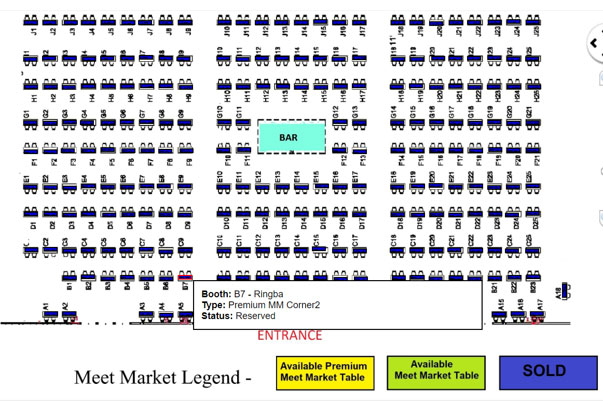
This is the meet market legend at Affiliate Summit West. This is one day. You only get one shot. Even if you’re good at this, and you want to hit every single table, the likelihood you can do that is very low. It is a big event, and it is exhausting.
First, you need to make a list of all the people that are the most important to your business by priority. Then write down their booth number. If I were you, I just screenshot this, and you can just put a dot in Windows Paint if you have no computer skills on where you need to meet and have a list of all the booth numbers. You can have this right on your phone, scroll through it, and find the people you’re looking for.
Next step is all those people you want to meet. You’re going to connect with them all on LinkedIn. You’re going to make a list of everyone you want to talk to, even if they won’t connect with you so that you know who you need to talk to.
Schedule your most important meetings first, and try and do those about a month in advance because those meeting slots for the prominent people fill up quick, and if you try and do it last minute, it’s probably not going to work. Exchange contact info and try and get the cellphone number of the person, so you can text them before the meeting, “Hey, I’m going to be on time. I’m looking forward to the meeting. See you in 30 minutes at the corner bar,” or whatever it is. Put where the meeting is happening in that text message so that they have no excuse. Hold them accountable.
Then you want to figure out how many people you need to meet with that are important to you. You probably want to talk to them for; I don’t know, five to 15 minutes if you can. Then you need to determine a schedule to see how many meetings you can effectively do. If you want to meet with 67 people at this trade show, and you got to track them all down, and you only get one day to do it, you’re probably not going to meet them all. You need to prioritize all those people by what’s most important to you, and then you should have your pitch customized for every single one of these people, so you can tell them why you can drive value to them so that you can open up the relationship.
You should expect that some of your meetings won’t happen. People will cancel. Try and reschedule. No call, no show, whatever. Some people are crappy. You should expect it. Don’t get upset. Just keep on hustling. Don’t forget to RSVP for industry events. For Pay Per Call, we put all the Pay Per Call industry events on the forum there with the RSVP links, whether they are our event or not, so that you know where they are, and you can RSVP for them.
I’ll tell you right now that our last event hit capacity. We turned people away. The party the following night is we threw, too, also hit capacity. We turned people away. Show up early to the events. Maybe you wait in line. Maybe you walk in, and there’s not a lot of people there yet, but guess what? You’re inside. It’s a lot better than being outside if you want to meet people and do business.
Relationship Building / Online Cold Calling
Any cold calling is a numbers game. Some will, some won’t, so what? Someone else is waiting. Do not be offended if people won’t talk to you or if they won’t do business with you or they’re jerks or whatever. This is about you building a successful business, and if it were super easy, and everyone was required to do business with you, well, that would be a different world than we live in.
Business is hard. It requires real work. It requires commitment and dedication. If you’re unwilling to put that in and take some crap sometimes and be willing to chalk up some nose, you’re not going to be successful, so you should expect it. If you don’t expect it, that’s your fault, honestly.
Again, how you communicate is extremely, extremely important. It takes you more time to communicate well. I understand this and time is valuable, but your conversion rate when you communicate well is exceptionally higher than otherwise. It’s just like an advertising campaign. If you create a crappy ad that’s got misspellings in it with bad grammar, and you run it on Facebook with no image, and you look like you don’t know what you’re doing, no one clicks it, no one buys. It’s the same thing.
If you have got an excellent presentation, and it gets to the point, more people are willing to read it, and then more people will do business with you. It is the same thing as an advertising campaign. Again, expect to be told no, for people not to reply, and some people who don’t want to do business with, and maybe they won’t even tell you why.
When people tell you no, you should consider it a buying sign because guess what? They at least are talking to you because some people won’t, and those are the stubborn ones. Be persistent, but be polite. Don’t be offended. Don’t get defensive. It’s okay if someone doesn’t want to do business with you. We’re not fragile snowflakes here. We got to develop with thick skin.
Realize that your first attempt may not work. Just because you took the time to reach out to someone does not make you entitled to their reply, but that also does not mean you should not keep reaching out to them. Some people value persistence. If people don’t reply to you, change your approach because clearly, your strategy did not work.
Try and build a real relationship with someone versus immediately jumping to business. Some people want to get to business, and that’s fine. If they’re talking to you, and they wish to get to business, just get to business, but most of the time, you want to build a real deal with people because more often than not, people want to do business with people they like, not people that they can make money with, but people they like. Creating that relationship is extremely important and extremely valuable.
Online Cold Calling using LinkedIn
When cold calling on LinkedIn, it’s important to lead with a strong subject line. Let’s take a look at some selling subject lines if you’re an affiliate:
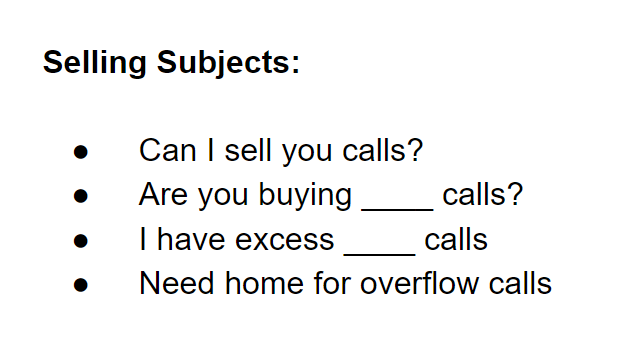
These are fantastic subject lines because they get right to the point. When you’re more explicit and get to the point, you’re going to get your responses or no responses.
On the other side, if you’re going to buy calls; here are some buying subject lines you can use:
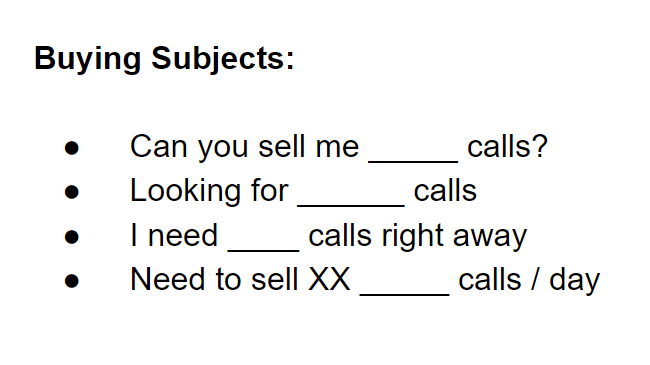
This is super simple, it’s not rocket science. You simply need to communicate clearly and concisely.
Here’s a simple script you can use for reaching out to prospective call buyers on sellers:
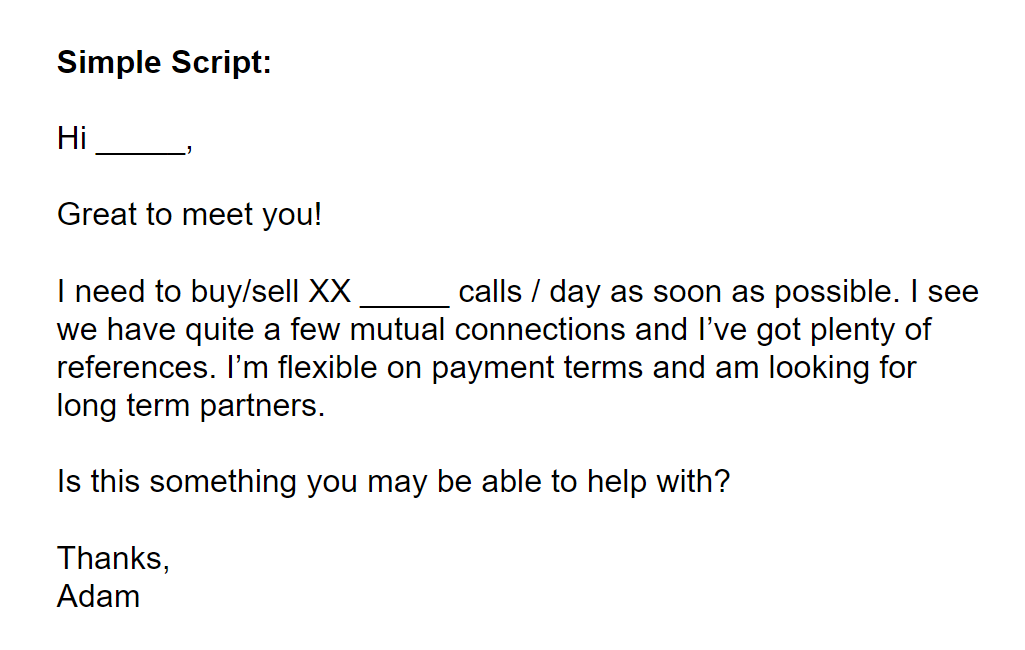
Just fill in the blanks! Here’s what that looks like:
“Hi, Bill. Great to meet you. I need to buy 300 insurance calls per day as soon as possible. I see we have quite a few mutual connections, and I’ve got plenty of references. I’m flexible on payment terms, and I’m looking for long-term partners. Is this something you may be able to help with?”
If someone opens this message, reads it, and doesn’t reply to you, they’re not interested, they don’t have those calls, they don’t want to buy those calls, they’re not the right partner for you. If they open this and read it, and they can buy or sell you whatever calls with this specific, simple message, I guarantee you; they’re probably going to reply. This is how you should be communicating when you cold call.
You can throw other stuff in there if you want to add personality. If they’re also from Tampa University and you went to Tampa University or Florida State or whatever, throw it in there, “Oh, hey, fellow Gator. How’s it going?” but quick, not a lot. Just simple and to the point. This is how you open up a relationship.
Online Cold Calling using Facebook
Facebook is the same thing. If you’re going to do it over Messenger, you need to get to the point and communicate well. Introduce yourself. “Hey, I’m Adam Young with Call Experts, and we specialize in insurance calls. You’re in the Pay Per Call space, right?” They’re like, “Yeah. I do insurance calls, too.” I’m like, “Great. How long have you been in the industry?” They’re like, “Oh, I’ve been doing it for the last couple of years.” “Cool. How long have you been doing insurance?” “Oh, same thing, the whole time, man.” “That’s awesome. I really like insurance calls. Have you seen anything interesting in the industry happened lately?” “Oh, yeah, with some changes into whatever.” “Oh, cool, man. That’s awesome. Were you at Affiliate Summit?” “Yeah. It was great. Had a lot of fun at the call party, whatever.” “Good. Awesome.”
A lot of people who complain that they can’t get into this space, well, they’re violating all the rules I told you before with their Facebook profile and all the nonsense on it. They’ll communicate clearly and type like a 14-year-old girl who’s angry texting. You need to be professional.
Here are some straightforward replies or posts from people who are professional in the space:
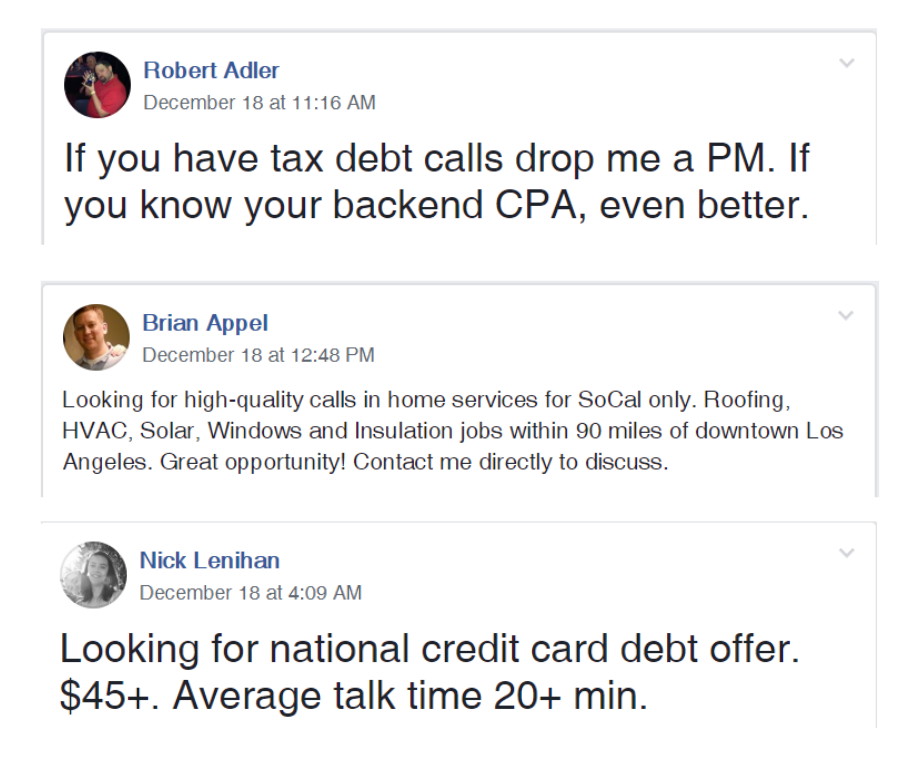
I know all these people. I’ve talked to them personally. They’re all cool people, but they all do it the same way because there’s one way that works. There are not a million ways – there is one.
If you have texts that call, drop me a private message if you know your backend CPA, even better. What’s he saying? He’s saying if you got texts that calls, call me. If you know how the hell this business works, I want to talk to you. If you’re not an idiot, hit me up. It doesn’t matter what time of day. Most of these people will reply whenever, especially the ones here. If you hit Robert up at 2:00 PM or 2:00 AM on Saturday and you’re like, “I got text calls, bro.” He probably would be like, “Great.” He’s going to reply. That’s why I love this industry.
Most people in this industry, if you communicate well, will reply to you seven days a week, 365 days a year because they’re all hyper-connected. If you don’t get a reply, they saw it; they don’t want to reply to you. Same thing with Brian here, “Looking for high-quality calls and home services for South Cal, roofing, HVAC, solar windows, installation jobs, within 90 miles Downtown Los Angeles. Great opportunity. Contact me to discuss.”
The same thing with Nick, “Looking for a national credit card debt offer, $45 plus payout, average talk time on my calls is 20+ minutes.” That’s simple. “My calls are quality. I need to be paid for them. Hit me up. I’m a real human being. I communicate to the community with my real name and who I am. You know you can at least trust me enough that I don’t want to ruin my public reputation.” That’s it. That’s how the whole business operates.
Online Cold Calling using Skype
Same thing, guys. Communicate clearly. Use the same name across all verticals, all mediums, all communication channels. If your name is Adam Young on Facebook, it should be Adam Young on Skype. It should be Adam Young on LinkedIn. Your email should be adam.young or adam@callexperts.com or whatever. You need consistency. What people are looking for is professionalism, consistency, and accountability because they interact with the community.
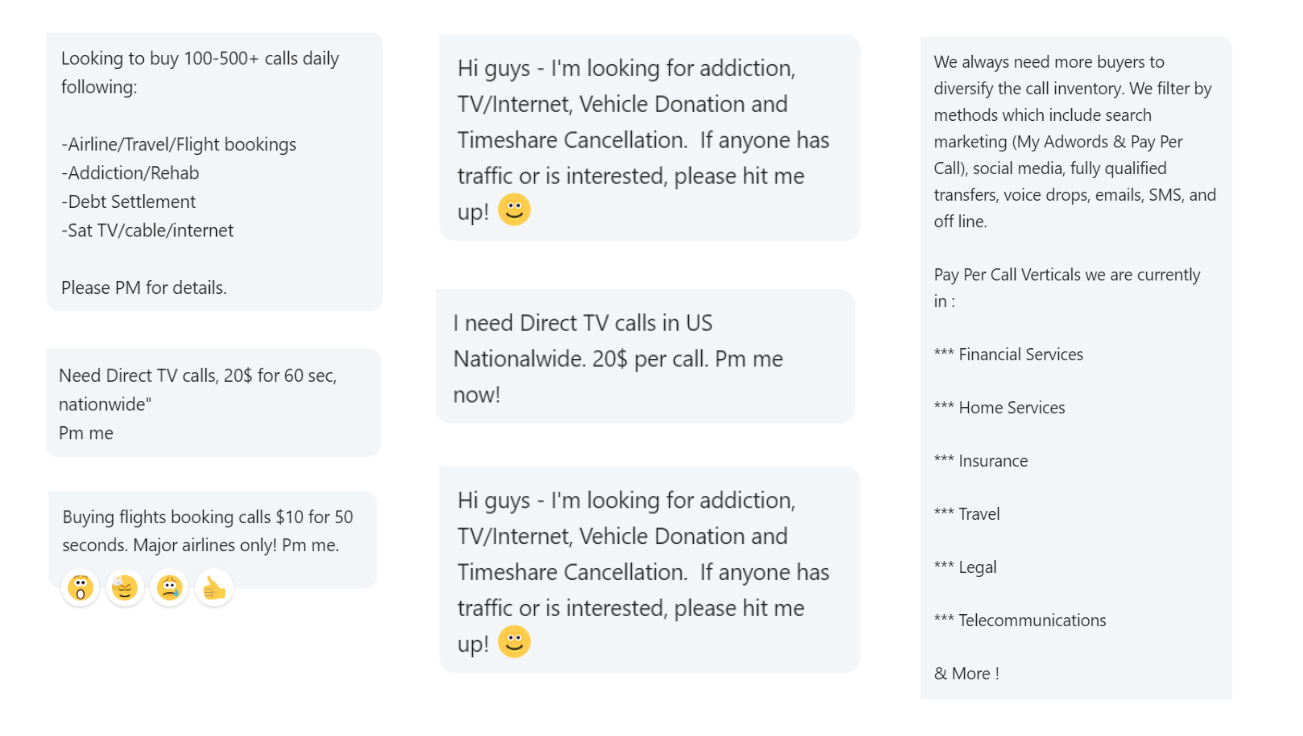
“Looking to buy one to 500 calls a day. Airline travel flight booking, addiction rehab, debt settlement, and satellite TV cable internet. Please private message me for more details.” That’s it. “You want to work in the space; this guy is looking for more partners. Need direct TV calls, $20 for 60 seconds nationwide. PM me.”
What’s he saying is he wants to buy direct TV calls. He’s willing to pay $20 a piece with a minimum duration of 60 seconds nationwide coverage. That’s all you need to know.
Buying flight booking calls $10 for 50 seconds, major airlines only. Nice and simple. I am looking for addiction, TV, internet, vehicle, donation, timeshare cancellation. If anyone has traffic or is interested, please hit me up. Nice and friendly. Super professional. “I need direct TV calls.” This is the same example. I used it twice.
“Hey, guys. I’m looking for addiction, TV, internet, vehicle, donation.” This one is twice, too. I’m going to kill my editor, but you guys get the point. We always need more buyers to diversify call inventory. We filter by methods, which include search marketing, social media, fully qualified transfers, voice drops, emails, SMS, and offline. Pay Per Call verticals that we’re currently in, financial services, home services, insurance, travel, legal, telecommunications, and more. What they’re saying is they take all sorts of traffic sources across all kinds of industries and to hit them up if you want to do business.
In summary, the most important thing from this lesson is to conduct yourself with professionalism. Make sure all your ducks are in a row, that all your communication is clear, concise, and professional. Use your real name, use your real contact information, and people will accept you into the community, and they will do business with you.

